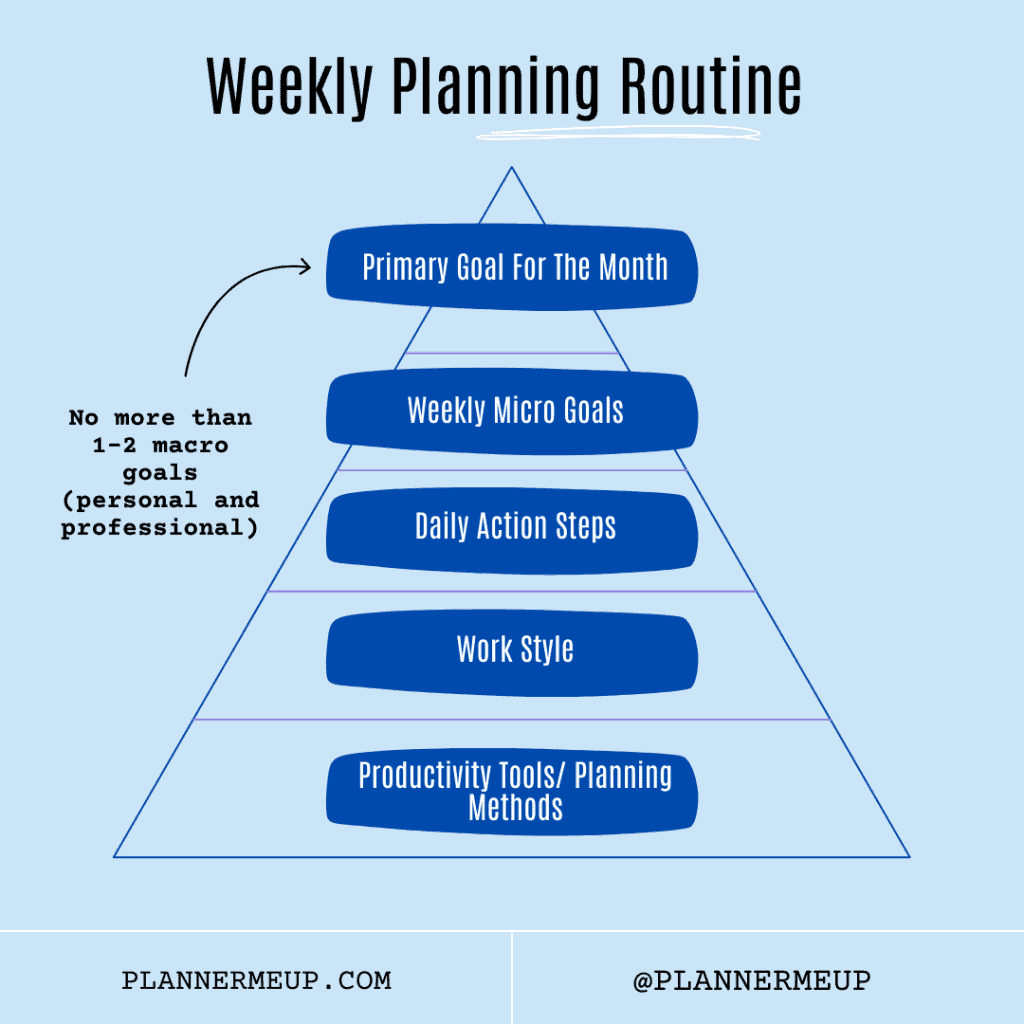
What are the benefits of a weekly planning routine?
Have you ever experienced unproductive days, week after week? If so, then you may benefit from following a weekly planning routine.
Weekly planning routines take a strategic approach to structuring your work week.
They involve the creation of daily schedules and task lists, but also yield many benefits. Some of which include a boost in productivity, less procrastination, and healthier lifestyles.
An organized weekly schedule leads to less stress and a peace of mind.
Knowing what you’d like to accomplish for the week is much easier than waking up every morning and writing a random to-do list on a whim.
How often do you complete the tasks listed in your weekly spread?
It’s often decorated with washi tape, stickers, and highlighted with all the colors of the rainbow, but it doesn’t promise productivity.
Planners, notebooks, bullet journals, and digital apps are all productivity tools we can use as resources to plan for the week ahead.
What happens if you’re great at structuring your day on paper but not in real life? This is one of the main reasons developing a weekly planning routine is beneficial.
It allows us to incorporate flexibility into our weekly plans by managing our time and following a working style that meets our needs.
How do you get things done? Are you a list maker or physical planner? Do you prefer a simple monthly calendar? Or do you like to use cool productivity apps such as Notion to keep you on track?
Plan your week according to your preferred working style.
Now that we have the tools and planning methods out of the way, let’s get down to business!
Answer the following questions to determine your preferred work style:
- Are you comfortable sitting a few hours at a time to focus on tasks?
- Do you prefer to work in short 30-minute sprints with breaks in between?
- Is it difficult to get back on task once you’re distracted?
- Are you disciplined with reaching your daily goals?
- What activities or things lead you to be less productive?
- What activities or things boost your daily productivity?
Take a minute to reflect on your answers.
What are some immediate habits you can change today that will make a difference in your ability to be productive tomorrow?
Once you have determined a working style that compliments your productivity flow, you can develop a weekly planning routine.
The most important step is creating goals for the week. Each completed task should attribute to moving the goalpost forward, which will positively affect your professional and personal life.
Don’t overwhelm yourself with setting seven individual macro goals for each day of the week.
The top three things you prioritize for the week should be action steps or micro goals that will lead to the overarching primary or macro goals for the month.
Picture your weekly planning routine as a pyramid. The top triangle should be 1-2 primary macro goals.
1-2 micro goals per week should then follow these goals.
Action steps should comprise the daily tasks you prioritize to meet your weekly goals. Select your work style and choose the planning tools that work best for you.

Benefits of developing a weekly planning routine
Organized schedule
Approaching the week with a plan of action in place will keep you organized.
A weekly planning routine frees up more mental space to focus on things that matter. There’s also a sense of structure for the week before it begins.
Appointments get scheduled, meetings get booked, daily routines get batched, and we sprinkle social events throughout the weekend.
An organized schedule prevents you from running around like a chicken with its head cut off and equips you with a peace of mind.
Remember to create space for flexibility. Anticipate mishaps and emergencies even when they may not occur at all.
Your weekly planning routine shouldn’t be restrictive. Planning the week ahead should not chain you to your routines and tasks.
We can’t predict hiccups and accidents that occur on a whim, but we can plan the week based on the things we can control.
What would you like to accomplish for the week?
Maybe it’s freeing up more space in your home or decluttering your closets.
It may be a creative project or craft you’re producing, or forming a new habit that will help you reach your fitness goals.
When creating schedules, it is important to keep personal accountability at the forefront of your mind.
This means not only writing your weekly goals but sticking to them. Make sure that they are intentional and serve a purpose.
A weekly plan will help increase your productivity and move you closer towards achieving your goals.
Weekly Planning Lists
Most people will encourage you to purchase a stationery paper planner, or even invest in a digital planner to reserve space and stay organized from the palm of your hand with different apps.
I’m from the old school way of thinking.
You can create your weekly plan on a sheet of notebook paper (or the back of your hand!).
Whatever works best for you!
Sunday is the perfect day to create daily to-do lists.
It’s at the top of the week.
You should be well-rested from the weekend and ready to do a massive brain-dump to jumpstart the week at full speed.
Rather than writing daily to-do lists the night before, try Sunday evening.
This part of the weekly planning routine forces us to focus on the non-negotiables. What are your must-dos for the week ahead?
Take your time to carve out at least three tasks or activities you can prioritize each day.
They should include tangible action steps towards your goals.
You can’t complete a 30-day project in one week without burn out. So, break it up, piece by piece.
Sure, you can plan each week in advance, but I don’t advise it. Too many things change and unexpected events occur within a short time frame.
Unless you’re a hyper-focused individual and extremely disciplined to check all the boxes off your monthly calendar, stick with weekly planning lists.
We should reserve monthly planning for larger projects, specific event dates, and conceptualizing the bigger picture.
Another pitfall to avoid is jam packing your month with various minor projects at once.
Choose one extensive project, then divide the tasks and activities needed to complete them over a four-week span. This guarantees progression and reduces the likelihood of overwhelm.

How to plan your week to be productive?
Work Routine
Keep any work-related tasks and projects separate from your personal life.
Trust me, creating balance is a game-changer! Business owners and freelancers can apply this practice as well.
A paper or digital planner used strictly for work can be beneficial.
It keeps your workday organized, tracks project timelines, keeps meeting schedules all in one place, and attributes to a healthy work-life balance.
Complete your daily to-do list at the end of each business day. Note any important weekly meetings or significant events in a few places.
Keeping reminders in various places is always a good practice.
There are so many moving parts and the frequent need to pivot. Therefore, planning out the entire work week in advance may be a waste of time.
Don’t stress out about getting everything done on your to-do list.
Manage your time wisely, focus on one task, and move anything additional to the following workday.
Home Routine
Your home life doesn’t have to be hectic and crazy upon your return or when you log off for the day.
If you work from home try to get some chores done during your break periods.
One benefit of working remotely is the ability to check off a few tasks from your weekly planning list before noon.
Whether it’s washing a few dishes, throwing a load in the dryer, tidying living spaces, or just making your bed in the morning, do them throughout the workday.
For those who work in an office, use a weekly chart and menus to keep you and your family on track.
Post the charts on the refrigerator or designated place where your family can easily view and access it.
Weekly planning spreads or a simple list to cross off chores, meal prepping, and bill payments should be enough to keep you on track.
Personal Routine
Your routines should include your daily habits.
Eating breakfast, exercising, journaling, meditation, and staying hydrated may all be activities in your morning routine.
In the evening, self-care, mindful eating, leisure activities, socializing, and rest may be a part of your weekly personal routine.
Incorporating these routines into your weekly planning template is essential for building a productive week.
You can use habit trackers to monitor sleep patterns, water intake, and fitness training as well.
Weekly plan for students
A weekly plan for students is pertinent for keeping academic schedules extremely organized.
Students of all levels have a plethora of responsibilities and activities to juggle.
Staying stress free, developing time management skills, and improving study habits are some advantages of creating a weekly plan for students.
With so many course assignments, exams, and projects to complete daily; a strategic weekly plan for students comes highly recommended.
Learning how to keep all plates spinning in the air as a teenager and college student can be challenging.
Therefore, a weekly plan for students to remain productive plays a major role in their ability to excel academically.
Check out the weekly plan examples for students below:
- Dedicate at least 1-2 hours to studying for each class
- Dedicate an hour of focus work to complete homework assignments and projects
- Prep your meals for the next few days. This can be easy meals including smoothies, overnight oats, wraps, salads, pastas, and protein.
- Schedule social and extracurricular activities for only 2-3 days during the evenings and weekend to ensure a balance between work and school

4 Essential Tips On How To Make Weekly Plan
What is your working style?
Before you make a weekly plan, assess your workflow preferences.
What rhythms and routines get you into a flow state of productivity?
Where do you work best?
- Private home office
- Coffee shop
- Traditional office spaces
- Group settings
How do you prefer to work?
- Independently or with a team
- In a quiet or noisy environment
- With supervision or autonomous
- Self-starter or follow a morning routine to jump start your day
- 25-minute focus sprinter or time blocker
Focus sprints and time blocking are productivity strategies that increase the ability to focus and get more done in less time.
Limiting your daily priorities to only 1-3 key tasks helps with eliminating stress and overwhelm.
Major projects don’t have to monopolize your weekly planning list.
Sometimes, it’s best to go with easy opportunities to accomplish a few easy wins for the day.
Happy weekly planning, goal-friends!

I teach entrepreneurs how to simplify their life and business with less + own their time and maximize productivity towards their personal and monetary goals.





Leave a Reply